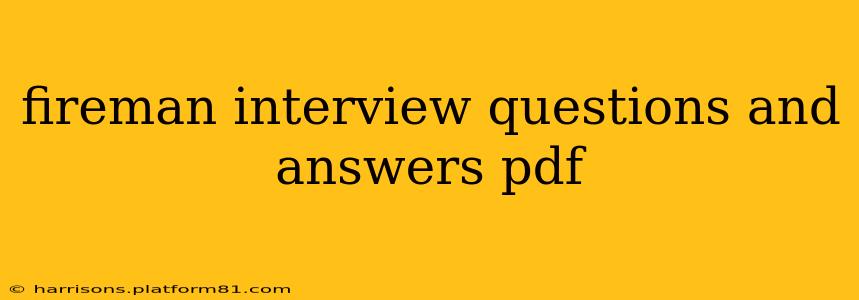Becoming a firefighter is a highly competitive process. Beyond the physical demands, the interview stage is crucial. This guide provides comprehensive answers to common fireman interview questions, helping you prepare for a successful interview and land your dream job. We'll cover everything from behavioral questions to technical knowledge, ensuring you're well-prepared to impress the hiring panel.
Common Fireman Interview Questions and Answers
Here are some frequently asked questions in fireman interviews, along with detailed answers that demonstrate your suitability for the role:
1. Why do you want to be a firefighter?
This seemingly simple question probes your motivation. Avoid generic answers. Instead, focus on your personal values and experiences. For example:
"I've always been drawn to helping others, and the firefighting profession embodies that perfectly. I'm fascinated by the technical skills involved, the teamwork required, and the opportunity to make a real difference in people's lives during their most vulnerable moments. The challenges inherent in the job, both physical and mental, appeal to my desire for continuous learning and growth."
2. Describe a time you worked under pressure.
This is a behavioral question assessing your stress management skills. Use the STAR method (Situation, Task, Action, Result):
"During my time as a volunteer EMT, we responded to a multiple-vehicle accident on a busy highway. (Situation) My task was to triage patients and coordinate with other responders in a chaotic environment. (Task) I prioritized the most critically injured, delegated tasks to my team, and maintained clear communication under immense pressure. (Action) As a result, all patients received prompt medical attention, and we successfully coordinated the evacuation of the scene. (Result)"
3. How do you handle conflict with colleagues?
Firefighting relies heavily on teamwork. Highlight your conflict resolution skills:
"I believe in open and honest communication. If a conflict arises, I approach it directly, but respectfully, aiming to understand the other person's perspective. I focus on finding solutions that benefit the team as a whole, rather than focusing on personal disagreements. My goal is always to maintain a positive working relationship."
4. Tell me about a time you failed. What did you learn?
This question assesses your self-awareness and learning ability. Choose a genuine example, focusing on the lessons learned:
"In my previous role, I failed to anticipate a crucial step in a project, resulting in a minor delay. (Situation) I learned the importance of meticulous planning and anticipating potential obstacles. (Action) Now, I proactively identify potential issues and develop contingency plans to prevent similar situations from occurring. (Result)"
5. Are you comfortable working in a high-stress environment?
Answer with confidence and provide specific examples:
"Absolutely. I thrive in high-pressure situations. My experience as a [mention relevant experience, e.g., paramedic, military personnel] has prepared me for the demands of a fast-paced and stressful environment. I remain calm and focused even when confronted with emergencies, prioritizing safety and efficiency."
Frequently Asked Questions (FAQs) About the Fireman Interview Process
1. What are the physical fitness requirements for becoming a firefighter?
Physical fitness requirements vary depending on the department. Expect tests assessing strength, endurance, and agility. Check the specific requirements for the department you are applying to.
2. What is the background check process like for fireman applicants?
Background checks are thorough. Expect scrutiny of your criminal history, driving record, and credit report. Honesty and transparency are crucial throughout the process.
3. What kind of training can I expect after I’m hired as a firefighter?
Expect extensive training in areas such as firefighting techniques, emergency medical response, hazardous materials handling, and rescue operations. The training is rigorous and continuous.
4. What are the common types of firefighting equipment used?
Common equipment includes self-contained breathing apparatus (SCBA), fire hoses, nozzles, axes, hydraulic rescue tools (Jaws of Life), and thermal imaging cameras (TICs). Training will provide detailed instruction on their use.
5. What are the career progression opportunities within the fire service?
Opportunities for advancement exist, including promotion to higher ranks (e.g., lieutenant, captain, chief), specialization in areas such as hazardous materials or rescue, or moving into administrative or training roles.
This comprehensive guide provides a strong foundation for your fireman interview preparation. Remember to research the specific department you're applying to and tailor your answers to their needs and values. Good luck!
